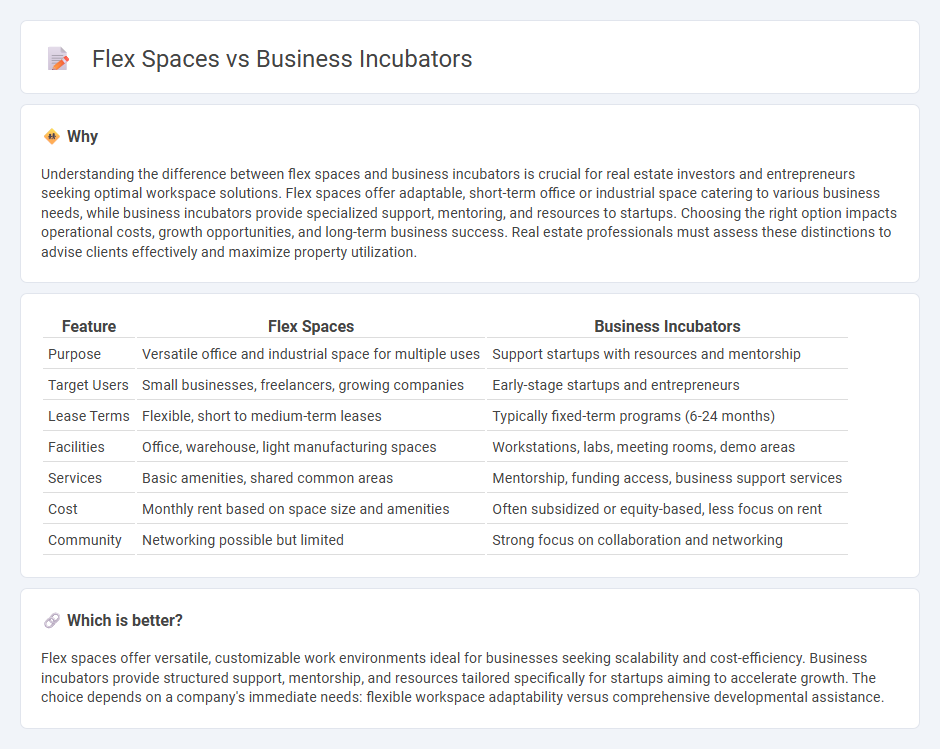
Flex spaces offer versatile, scalable office environments designed to accommodate diverse business needs, while business incubators provide targeted support, mentorship, and resources to early-stage startups. Flex spaces emphasize adaptable layouts and short-term leases, ideal for growing companies seeking flexibility, whereas incubators focus on fostering innovation and accelerating business development through shared services and networking opportunities. Explore the key differences and benefits of flex spaces versus business incubators to determine which solution best suits your business growth strategy.
Why it is important
Understanding the difference between flex spaces and business incubators is crucial for real estate investors and entrepreneurs seeking optimal workspace solutions. Flex spaces offer adaptable, short-term office or industrial space catering to various business needs, while business incubators provide specialized support, mentoring, and resources to startups. Choosing the right option impacts operational costs, growth opportunities, and long-term business success. Real estate professionals must assess these distinctions to advise clients effectively and maximize property utilization.
Comparison Table
| Feature | Flex Spaces | Business Incubators |
|---|---|---|
| Purpose | Versatile office and industrial space for multiple uses | Support startups with resources and mentorship |
| Target Users | Small businesses, freelancers, growing companies | Early-stage startups and entrepreneurs |
| Lease Terms | Flexible, short to medium-term leases | Typically fixed-term programs (6-24 months) |
| Facilities | Office, warehouse, light manufacturing spaces | Workstations, labs, meeting rooms, demo areas |
| Services | Basic amenities, shared common areas | Mentorship, funding access, business support services |
| Cost | Monthly rent based on space size and amenities | Often subsidized or equity-based, less focus on rent |
| Community | Networking possible but limited | Strong focus on collaboration and networking |
Which is better?
Flex spaces offer versatile, customizable work environments ideal for businesses seeking scalability and cost-efficiency. Business incubators provide structured support, mentorship, and resources tailored specifically for startups aiming to accelerate growth. The choice depends on a company's immediate needs: flexible workspace adaptability versus comprehensive developmental assistance.
Connection
Flex spaces provide adaptable office environments that cater to startups and small businesses, making them ideal locations for business incubators seeking to nurture early-stage companies. Business incubators leverage flex spaces to offer affordable, scalable work areas combined with essential resources like mentorship and networking opportunities. This synergy supports innovation and business growth by aligning flexible infrastructure with targeted entrepreneurial support services.
Key Terms
Shared Workspace
Business incubators offer structured support services like mentorship, funding access, and networking opportunities, specifically designed to accelerate startup growth within shared workspaces. Flex spaces provide customizable, scalable office solutions emphasizing flexibility and cost-efficiency for freelancers, remote workers, and small businesses. Explore detailed comparisons to determine which shared workspace model best suits your business needs.
Lease Flexibility
Business incubators offer startups structured lease terms with added support services, fostering innovation within a dedicated environment. Flex spaces provide highly adaptable lease options, allowing businesses to scale up or down quickly without long-term commitments. Explore more to find the best solution that aligns with your company's growth and operational needs.
Startup Support
Business incubators provide startups with mentorship, access to funding, and structured programs designed to accelerate growth and innovation. Flex spaces offer flexible office environments without extensive support services, ideal for startups needing scalable workspace rather than developmental resources. Explore how these options can align with your startup's growth strategy and support needs.
Source and External Links
Neighborhood Business Incubators - Neighborhood business incubators support entrepreneurs by offering free or low-cost workspace, mentorship, access to investors, and industry-specific resources tailored to help new businesses grow, especially benefiting BIPOC- and immigrant-owned small enterprises.
What is a business incubator? | BDC.ca - Business incubators provide early-stage startups with mentorship, investors, shared office space, and resources to develop a minimum viable product and transition to market, typically supporting companies in their embryonic phase for several months to years.
Business incubator - Wikipedia - Business incubators help startups by offering comprehensive services such as management training, access to capital, office space, networking, marketing assistance, and legal and accounting support to overcome initial business hurdles.
 dowidth.com
dowidth.com